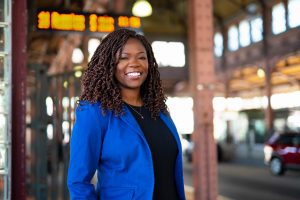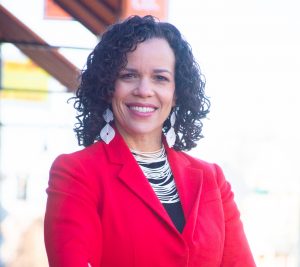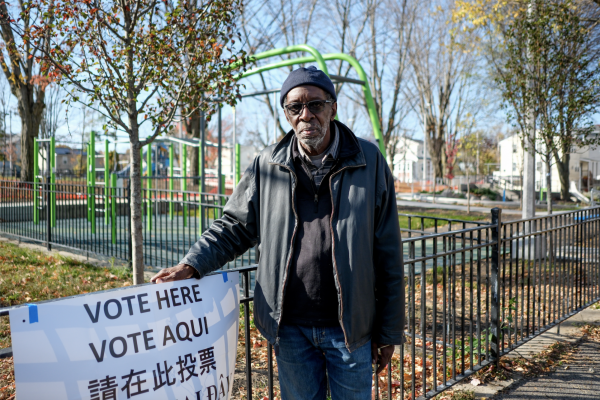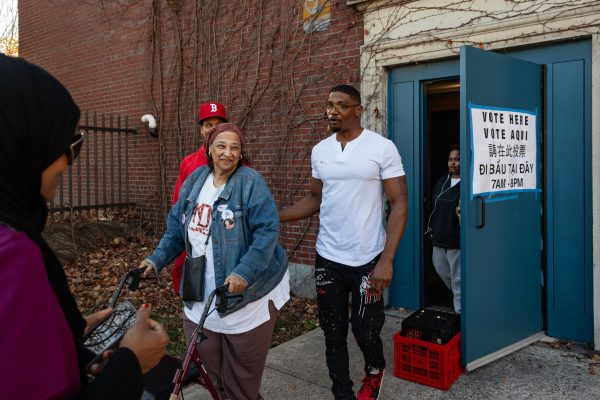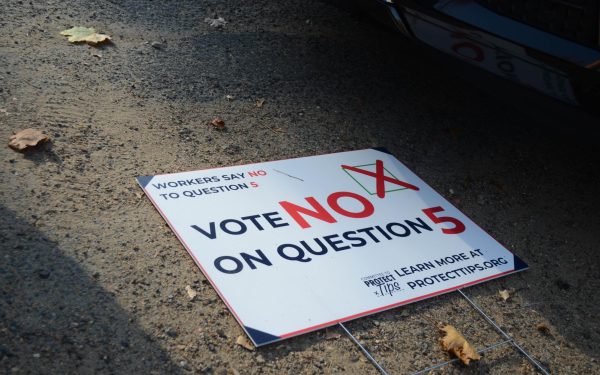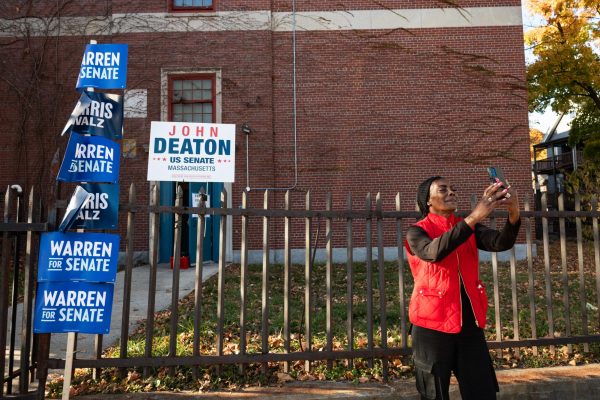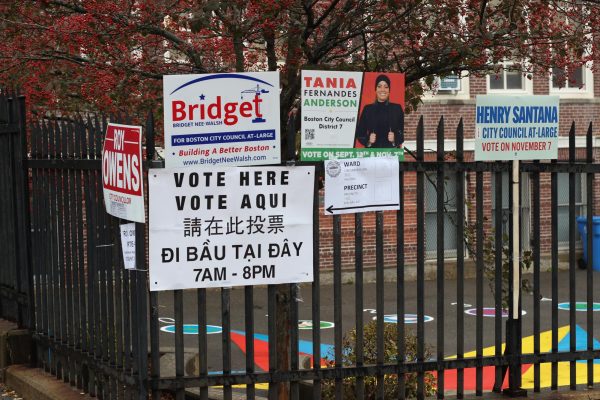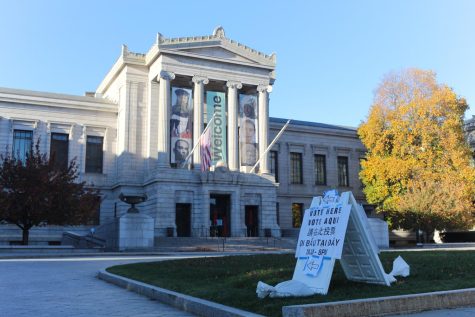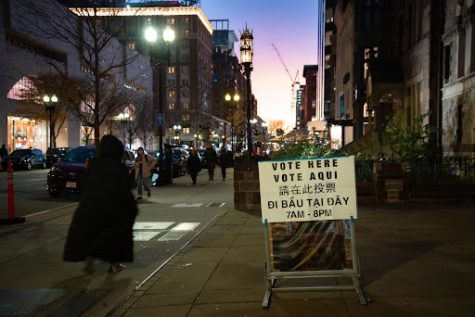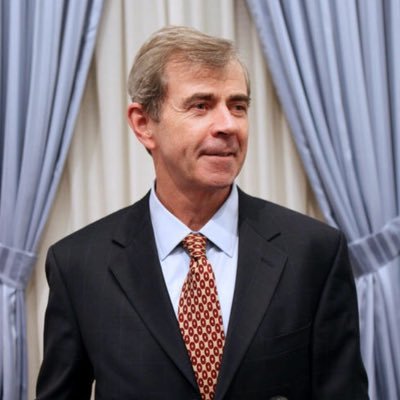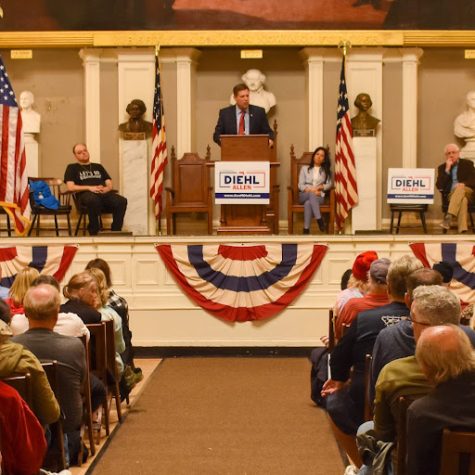City council race: Gabriela “Gigi” Coletta running for District 1
Editor’s Note (4/7): The spring election for the next D-1 councilor will be held on Tuesday, May 3, 2022. For more information about the election, please visit here.
Gabriela “Gigi” Coletta, political organizer and external relations manager at the New England Aquarium, is running to be the next District 1 City Councilor. District 1 includes the East Boston, North End and Charlestown neighborhoods.
She is currently running against Tania Del Rio, a local community leader and BPS parent.
Before leaving to work at the New England Aquarium, Coletta served as former District 1 City Councilor Lydia Edwards’ chief of staff. In 2021, Edwards ran as the incumbent and unopposed in the Boston City Council elections for District 1 while simultaneously running a bid for the state Senate. In November, Edwards was reelected to the Boston City Council. On Jan. 11, 2022, after winning a special election in Dec. against a rival Democrat candidate and then again unopposed, Edwards was elected to the Senate, opening up the District 1 seat. Senator-elect Edwards will be sworn in on Thursday, Jan. 20.
A special election for the Boston City Council District 1 seat is likely to be held sometime this spring.
Coletta is no stranger to politics and has led a career amplifying and pushing for more women, especially of color, to enter Mass. politics through her former position as the Massachusetts Women’s Political Caucus associate director. The East Boston native is confident that her past roles have afforded her the experience and aptitude to tackle some of the significant problems facing constituents in District 1 and throughout Boston.
“We’re dealing with a lot of issues here, a lot of long-term challenges that need investments and solutions today,” Coletta said. “I’m going to bring that experience to this role.”
Her campaign’s key focuses are on affordable housing, education, environmental justice and constituent services.
The Scope spoke with Coletta about these issues and her plans to address them if elected as District 1 City Councilor. This interview has been edited for length and clarity.
Can you tell our readers a bit more about yourself?
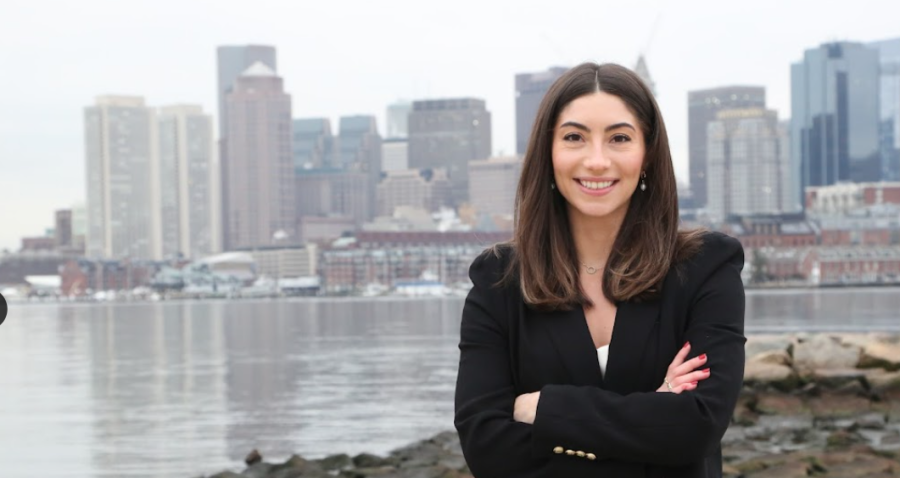
Yeah, of course, so I grew up in East Boston. I was born and raised in the Eagle Hill neighborhood to two community activists. [My parents] are two local journalists. My father was the editor of the local paper [when I was growing up], so he always brought me to events when he was covering things. My mom was a parent organizer. She grew up in the community, so she knew many people, but she stayed really grounded in the neighborhood. She took up a lot of important issues that were happening at the time. I would go to civic association meetings, neighborhood events and even multiple protests against—at the time—the airport runway expansion. East Boston is a community that bears the environmental burden of having a large international airport right next door to it. [My mother] ingrained in me a lot of injustices that were happening at the time. Granted, I didn’t have the tools or the knowledge, and I think the wording to think of the word injustice, but I knew there was something wrong. I knew that we had to fight against special interests in our community and really empower the community to stand up and come together.
I grew up going to these meetings where people who might not come from the same background [or] who were unfamiliar to one another, had the same goal … and it was to protect our neighborhood and fight for our neighborhoods. That was ingrained in me from a very, very young age. My parents also ingrained public service and giving back to your community as an important value. So, I carry that throughout my life.
Going to Boston Public Schools, I went to four different Boston public schools in my lifetime. I ended up graduating from Boston Latin Academy, which is an exam school in Boston. And even then, when I was in college, you know, this was the Obama years I got the “Obama-optimism.” That’s what I call it. It’s not a term I came up with, so don’t credit me with that. “Obama-optimism” is that government all the way down to the local level is a tool for good. With that thread of serving your neighbors, I knew I could serve my neighbors through local government. When I was in college, I got involved in the Obama campaign. I was really excited about that, and then when I was graduating from UMass Boston, there was a local state rep race that was happening. At the time, this was state representative Adrian Madaro in 2015. He embodied a lot of the same values that I had — his family was very much in public service. He pushed the community forward toward a more equitable community, giving access to everybody, no matter who you are or how long you’ve been there. So, I went to work on his campaign as the field director. That’s kind of how I knew to advance these progressive values that I grew up with.
So again, convening neighbors who are unfamiliar to one another but had this shared mission was incredible. And we were successful. He ended up winning. He brought me in as a community liaison where I was going back to these community meetings as his representative because he was at law school at the time, and so was his aid. So, I sat shoulder to shoulder with folks in the community in East Boston and listened to them, understanding their concerns, understanding their priorities and seeing where our community was going. There’s a lot of growth in our community, and a lot of folks feel like it’s not happening for them. It’s happening without them. They want at the table to define what that growth looks like. So, I was there [and] I brought that back to him in his office, and he worked with them through his official capacity as an elected official. From there, I went to work at the … to pay the bills … [I want to clarify that he] paid me, but that was more of a part-time thing.
Because I was so passionate about electing women pro-choice women to office, I went back to a nonprofit called the Massachusetts Women’s Political Caucus and worked as their associate director. In that role, I helped elect dozens of women running across the Commonwealth, and these are women of color, really pushing the envelope in their own communities. That was an incredible opportunity for me.
I helped to write the political action committee strategy at the time. So that was great. I stayed in the political realm pushing this sort of progressive slate of candidates. Then I got a call from my local elected city councilor; his name is Salvatore LaMattina. He said he was stepping down after 10 years of being in that office. A woman named Lydia Edwards, who I had met during her role and not too long ago, before this, for state Senate, was toying with the idea of running. I was floored by her policy prowess and ability to connect with people. I knew that she was the best choice at that time. So, I called her up. And I said, ‘Lydia if you do this, I’m going to be with you. I will do everything I can to elect you, including quitting my job at the Massachusetts Women’s Political Caucus and be your campaign manager.’ I think she credits that as the real push to do this because she felt supported. And so, I quit my job. She decided to run, and I was her campaign manager during that time, in 2017, between March and November, and really it was a tough battle. It was a contentious race.
We were up against a well-entrenched person who was known in the neighborhood. He raised a lot of money. Lydia isn’t from here. She’s from Chicago. There was a lot of this new and old Boston [talks] that people were grappling with at the time. Lydia was able to present these new ideas and say [that] we can be bold as a city. We can be innovative. We can do certain things while also focusing on the day-to-day constituent services. And that resonated across the District. We ran a really robust grassroots campaign, and we ended up being successful, and it was an incredible experience. It was very formative for me as a person.
From there, I was her chief of staff for four and a half years. I continued learning and being in the community, not just in East Boston this time around, but in the North End and Charlestown, which is what this District encompasses. So I’ve been on the ground, still in these communities, understanding what’s happening, really learning from folks what they want to see in their city councilor, and what they wanted Lydia to do at the time.
And then, just as an FYI, too, it was only about six months ago that I left that office. I was there for three and a half years. For the last six months, I have transitioned to the New England Aquarium as their external relations manager, taking on climate resiliency issues and ensuring that our waterfront is resilient, inclusive, and accessible for everybody. So that’s what I’ve been doing for the last six months, but I feel compelled to come back and call back to public service, kind of closing that circle of it being the only thing that I’ve ever known.
I’m really excited. I feel great support across the District. Folks know me, they trust me and it feels good so far.
Would you say then that your platform will be similar to Councilor Edwards’? Are there differences between each campaign? If elected, do you plan to continue any of the work that she has already done in the District so far?
Of course. She has done an incredible job, and I am so grateful to her for her mentorship and her leadership. She has shown that you can focus on the larger policy while focusing on the constituent services. We have a lot of similarities in our platform. I’ll start with those first, and then I can get into the differences, but in terms of housing, you know, she has been an incredible advocate on the Council for affordable housing, and that is something that I want to make sure that I focus on.
A lot of my neighbors have been displaced because of gentrification. My own personal story is that I was rent-burdened up until last year, and I’m still a renter. It wasn’t the case until I moved in with my partner, Sebastian, that I was able to afford my own neighborhood. I know that is consistent across the District … for folks who have lived here for generations like my family has … or for folks who have just moved in or are undocumented. Prioritizing affordable housing is very important to me. I will continue that and try to come up with innovative solutions and work with the mayor to make sure that that is still a priority across Boston and in this District.
Another similarity for me is the education issues that [Councilor Edwards] worked on. This District is facing a lot of unique challenges when it comes to inequities in our educational facilities. We literally don’t have enough space. I know that BPS is working on that and creating tracks that make sense for families [so] that families can stay together. Right now, there’s a lot of talk about trying to get flagship schools in every neighborhood, which I intend to work on and focus on. I did go to an exam school, and I would love to keep something similar to that model because I’m very lucky that I went to one of the most diverse high schools in Boston. I would never trade that experience or deny that experience to anybody else. But because there’s so much emphasis on the exam schools, I want to expand those opportunities for kids into Charlestown, the North End and East Boston.
Just continuing and carrying the baton in a way, I’m going to focus heavily on environmental justice and climate change. That’s something that I’m working on at the aquarium and getting into what it means if we don’t protect our waterfront today. Looking at the maps of 2070 really scares me because half of my district is underwater. There’s a figure out there that says that if you for every dollar invested today in climate resilience, it saves $4 down the line because you’re protecting residents. You’re protecting businesses from flooding. We need to make those investments today. The city has a good opportunity with the federal money coming in to use that money and employ modern and contemporary climate resiliency strategies. That’s something that I’m going to push developers to look at and push our city to develop a districtwide, comprehensive waterfront plan.
Another point on that is East Boston is an environmental justice community. I mentioned the airport earlier in our conversation, and we do bear the burden of many environmental factors … and then we have diesel trucks coming through a transit corridor coming from the North Shore, which bottlenecks in East Boston on Porter Street. We breathe that fuel every day. Even though it’s decreased a little bit because of the pandemic, it’s still something that we’re dealing with. A lot has been said about tree cover and canopy, and it is important. I mean, trees allow us to breathe clean air, and that shouldn’t be a luxury. That’s something that I will look at and see how we can streamline the process to get more trees to folks who want to plant them right now. It takes way too long to request the tree in the city of Boston, so getting that up and running. There’s ways to hold Massport accountable. And I intend to do that in partnership with my colleagues at the Statehouse. There are numerous levels of negotiations for residents to receive the compensation and dignity they deserve. So, that’s in my heart. That’ll never leave, and I’ll be sure to be a strong advocate in that regard.
Then the last thing that I think Lydia and I don’t necessarily differ on, but what I will prioritize in my time in the Council is excellent constituent services. Lydia was great with policy, and she was great with constituent services. For me, I intend to be in the community, walking the streets every week. Seeing your city councilor and having access to this individual is real, and it should happen as a city councilor because you are closest to the people. I intend to deploy walking tours that are livestreamed for folks that can’t necessarily walk and make sure that they’re translated in Spanish so that we can physically see some of the issues.
I mean, I’m looking at a faded crosswalk right now, and you know, on these walks, I want folks to point this out to me, ‘Oh, look at that pothole, what can we do? What’s the timeline on that to get that fixed? Look at that light post, it’s out … how can we fix that?’ I intend to be in the community and making sure that I’m constantly accessible to residents to help solve some of these issues. Those are the top priorities for me, at least in this campaign, and hopefully, if I become city councilor.
District 1, especially East Boston, has a very strong immigrant population and a lot of residents whose native language is not English. How do you plan for your platform to be inclusive to these groups while also building equity within these communities?
Yeah, that’s a great question. Language accessibility and being an inclusive leader is very important to me. I want folks to know that no matter who you are … your race, ethnicity, socioeconomic status … you will be represented by your city councilor. It’s all about centering that equity and being intentional and inclusive in every conversation. It starts with the little things, right? On my website, I’m in the process of translating it so that folks can have access to the information that I’m putting out there. Right now, it’s just a Google Translate, and I know that we can do better, and it carries to the city of Boston; there are some things that are translated, there are some things that are not translated, and we could be so much better. I know that there’s some talk in the City Council for language, accessibility and making sure that meetings have translation services. Some departments are better than others, but we could be so much better. That’s important to me, but even in conversations, going toe-to-toe with special interests, centering the lived experience of immigrants is key for me. When I’m thinking about these development projects or any sort of policy, I am thinking, ‘How does this impact the second or third-shift worker taking the T or has to take an Uber because the T isn’t working?’ There’s that money that they might not have. They don’t have access to these sorts of conversations. They might not even know to call their city councilor to help them. How am I helping that person? It’s intentionality and bringing those perspectives into the conversation, and I intend to do that.
The third part of all of this is just making sure that I’m constantly available and accessible and reaching out to the immigrant community. I never want folks to think that I’m inaccessible, and I want them to know that I am reaching back out and continuously asking for their perspectives, continuously asking about what they’re going through in their lives, and how can we use policy or the role of the city councilor to help in that regard? I will always stand by my immigrant brothers and sisters. I intend to be a city councilor that’s inclusive of everybody.
What do you love about District 1?
This is a really fun question. Thank you for that. So immediately, my mind went to the waterfront. I love it. I love having access to the parks that we have here — understanding that it took a lot of years and investment and negotiations on behalf of the community to create and maintain them. I love the waterfront. I love the Mary Ellen Welch Greenway. I’m gonna try not to cry because Mary Ellen was an incredible individual, and she fought for this community. She was an incredible environmental activist, and she was a mentor to me; she passed not too long ago, but the Mary Ellen Welch Greenway is named after her and for a good reason. She created this beautiful green ribbon that runs through Boston. It’s an example of what we could have in Eastie in different areas. She had a vision for it. And she worked really hard. She brought in different people, different stakeholders to make sure that it happened. It was amazing during the [beginning of the] COVID 19 pandemic when the only thing you could do was enjoy open space. It was the great equalizer; folks from everywhere could come and take a walk down the Greenway. You didn’t have to spend any money. It was incredible. So I think those … the waterfront and the Greenway is the top for me, but I’m also a huge transit rider. I love taking the T. I’m a huge nerd for the Blue Line. I think it’s a pretty good line, and we are very lucky to have a great frequency on the Blue Line. It’s every four minutes. And you know, sometimes it does break down, and of course, we could always use better investments in our T system and also making it more affordable for folks, especially service workers coming in at wee hours of the morning. But I love the Blue Line, and I’m a huge transit nerd in that sense.
Is there anything else that you would like to tell our readers?
I would like to tell readers, I mean, today’s January 6 [the date this interview was conducted], so at the forefront of my mind is our democracy and how fragile it is. No matter what, people need to be involved; people need to come out and vote. Local elections are so, so important. It does create a pipeline of leadership. Even if you’re not a politician or don’t want to get really involved in politics, politics is in our everyday lives, affecting you. If you do have time, if you are so lucky to have time, get involved in any sort of local campaign. That’s how you really get to know your neighbors, meet new folks and meet like-minded people. And, you know, just make sure that you come out to vote because that’s how we protect it at the end of the day. If you’re involved locally, you get a chance to know your neighbor; even if you disagree with them, you’re able to have a conversation. So, it’s bridging that gap at a local level. And then obviously, you know, at the national level. We have a lot of work to do, but at least we can start here and start with your neighbor.
To learn more about Gabriela Coletta’s campaign, please visit: www.gabrielacoletta.com
Editors note: This article has been updated to reflect Senator-elect Edwards’ swear-in date to the state Senate on Jan. 20, 2022. It was previously unknown before publication.


